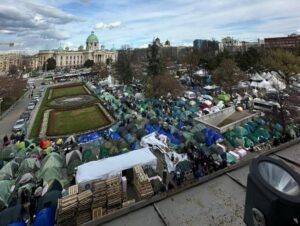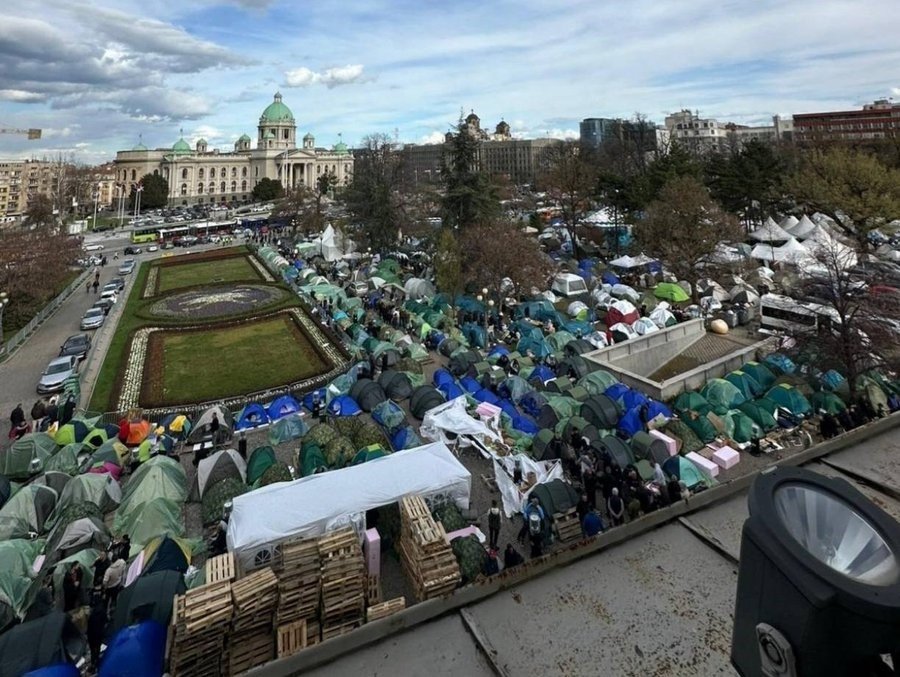Or would Serbian Children’s Crusade perhaps be a better description? Since the driving force behind the protests and the bulk of the protesters are university and high school students in their teens and early twenties, supported in many places by equally rebellious elementary school pupils, such a historically connotative description would not seem unwarranted.
For the last eight months, formerly submissive Serbia has been putting up stiff resistance to the perceived malfeasance of the ruling regime and its insatiably greedy minions. It all began on 1 November of last year when a concrete canopy at the newly “renovated” railway station in the northern city of Novi Sad collapsed, squashing to a horrible death sixteen innocent people who randomly happened to be in the wrong place and obviously at the wrong time. Within days, the authorities’ conspicuous reluctance to investigate the tragedy and refusal to identify or call to account any culprits aroused suspicions of colossal official malfeasance. The mishap quickly came to be perceived by the public as the direct result of official negligence and corrupt selection of favoured contractors. The latter are showered with sweetheart deals in return for profit sharing with crooked ruling party bureaucrats unconcerned with safety. The public’s conviction that the loss of life at the train station was not just a force majeure accident but a callously culpable act triggered nationwide protests in Serbia, spearheaded by university students who are demanding honest governance and accountability.
Contrary to the regime’s earnest expectations, after eight months spent on the streets, impacting practically every city, town and hamlet in Serbia, the energy animating the youthful protesters, subsequently reinforced by multitudes of dissatisfied citizens from all walks of life, is not dissipating.
The persistence of the rebellion poses an irresolvable quandary for both the beleaguered regime and its foreign backers. The authorities have played every card they had to calm the situation and have tried everything in their now evidently depleted bag of tricks, all to no avail. Their collective West sponsors, who installed them in 2012 assigning to the client Serbian regime certain important tasks that it would have to accomplish, are equally at a loss what to do next. The spontaneous nature of the unrest which has erupted all over Serbia and gives no signs of winding down is a disruptive phenomenon and not part of the scenario envisioned by any of the principal players.
Collective West establishment media for their part have clearly signalled that in the current political turmoil in Serbia the student movement are regarded as an unreliable, maverick force not under the direction of Western agencies. Their deep distrust was articulated recently by Frankfurter Allgemeine Zeitung Balkan correspondent Michael Martens in a hit piece published on 3 July and provocatively titled “The Dark Side of the Serbian Student Movement”:
“The trend that for some time has been noticeable but is barely registered abroad,” Martens reports from Belgrade, “is that the student movement, which continues to propel the protests, has been taken over by great Serbian nationalism, recalling the early years of the rule of the Serbian warmonger Slobodan Milošević,” a clear imputation of guilt by association. Need more be said to show the collective West’s visceral repudiation of the protesting Serbian students?
The confusion that has bedevilled many foreign observers stems from the fact that under the supervision of collective West agencies and special services, a carefully calibrated, slow-motion regime change operation has indeed been unfolding in Serbia for some time. Its commencement antedates the railway station tragedy of last November. That operation is led by Western financed and controlled local media and “NGOs.” Its purpose has been to apply pressure on the regime from below to accelerate completion of still pending “unfinished business” tasks (Kosovo, NATO) whilst simultaneously preparing the stage for cosmetic changes at the top to extend the system’s life expectancy. Such procedures are standard when sprucing up and revitalising a client regime, as opposed to toppling one that is hostile. Some personnel sacrifices must be made, but not with the intention of bringing the system down. The spontaneity of student-led protests throws a wrench into that scenario. The students have moreover stated explicitly that their ultimate objective is not regime but systemic change, a dangerous idea from the standpoint of all concerned. The fact that they are politically unsophisticated and lack a professionally elaborated roadmap to reach that goal is quite another matter. But even stating such an impetuous demand adds another, politically unpredictable and unacceptable layer to the stage-managed regime change process that had been set in motion before the railway station tragedy in November of last year. The insertion of that new layer disrupts the scenario since both the collective West and its vassal regime in Serbia are perfectly content with the existing neo-colonial system. They wish to preserve it because their respective interests are amply served by it.
It appears however that the top echelon of the regime may not be readily cooperative in agreeing to its voluntary departure, even under relatively favourable “Montenegro” conditions, if that could be arranged. Or is it perhaps simply driving a hard bargain? Its response is two-pronged. In the streets of Serbia, it has unleashed on peaceful protesters a parapolice force of thugs, wearing hoods and many with criminal records, who are considered more loyal to the ruling party than either the regular police or the military. They have licence to arrest, beat, maim, and crush bones, all of the above literally. Dramatic scenes of parapolice arrests of high school student Petar Grujičić and other dissidents, to the protests of outraged citizens, may be viewed HERE. But there have also been inspiring cases where decisive action by crowds of citizens, newly liberated from fear, have stopped regime thugs in their tracks as the latter attempted to snatch students away (see HERE).
To the embarrassment of Belgraders, with official approval a tent city encampment of those unsavoury elements has stood for months in the once pretty park between the Presidential office and the Parliament building, blocking pedestrian and vehicular traffic and posing an acute sanitary hazard in the heart of the Serbian capital. For an analogy to this method of repressing dissent one must enter a time machine and travel some geographic distance from Serbia back to the 1960s dictatorship of Haiti’s witchdoctor President Francois Duvalier and his Tontons Macoutes, the rogue special forces he had organised to intimidate and control the native population.

Regime loyalists’ tent encampment in the centre of Belgrade facing Parliament building
Parallel to these and other similar measures undertaken to contain domestic unrest, the regime is also engaging in a political offensive to delay its demise by pleasing its collective West masters. Of great significance in that regard are recent statements made by Nemanja Starović, Serbia’s European integration minister, that his government are prepared to impose sanctions on Russia if that would ensure admission to the European Union (gloatingly reported HERE by Ukrainian media) and would also be willing to make “extensive and painful” concessions on the issue of Kosovo in order to satisfy EU criteria for membership, alluding of course to formal recognition of the NATO occupied secessionist entity.
“Now the moment of truth has arrived. The awl of hypocrisy of official Belgrade has finally crawled out of the bag in which it was hidden,” Russian political analyst Igor Pshenichnikov has commented on these statements, and he is by no means alone in espousing such a view (also see HERE).
Though the details are a matter of speculation, it is reasonable to assume that as we are writing this the upper echelon of the Serbian regime (верхушка, as they would say in Russian) are engaged in intense negotiations to secure for themselves a golden parachute departure that would include assurances of personal safety, immunity from criminal prosecution, and continued access to the booty plundered over the last thirteen years in power. The West has no moral qualms about that, of course, as long as the outgoing puppets are replaced by the new set of bought and paid Serbian quislings, who are waiting in the wings. Once the terms are agreed upon and the deal is clinched, a delegation of ambassadors will visit Batista in the building adjacent to the tent city of his Tonton Macoutes to remind him to start packing his bags. And just like in Havana on New Year’s Eve in 1959, laden with ill-gotten goods and, like his pal Milo Djukanović in Montenegro, assured of impunity he will fly away into the sunset.
That is not a very cheerful prognosis, especially since it bypasses the child Crusaders and exudes little confidence in the ultimate success of their Intifada. But who ever said that life was fair? In a contest between ruthless professional scoundrels and starry-eyed idealists, however painful to bear, the outcome is rarely in doubt.



